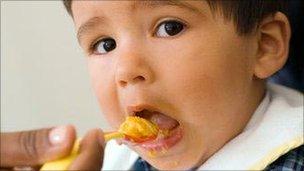Parents 'need baby food cookery classes'
- Published
- comments

Early tastes can shape the way we eat
There is lots of advice around about breastfeeding, but relatively little about weaning babies onto food, says Dr Helen Coulthard from Leicester's De Montfort University.
In this week's Scrubbing Up the psychology expert calls for parents to be given free cookery classes so they don't rely on packets and jars.
The ultimate goal of weaning is getting your baby to eventually eat the same foods as the rest of the family.
By relying too much on ready prepared foods, with their attractive packaging of fruits and vegetables, we may be making it more difficult for our children to eat fruits and vegetables when they are older.
Packaged foods may seem to parents like a convenient and safe weaning option.
But an over-reliance on packets and jars sets a pattern of using ready-made foods.
And it denies babies the chance to try the variety of tastes, textures and appearance that fresh foods have to offer.
Research shows that there is a window of opportunity for introducing tastes and textures to young infants, before the age of 12 months. After 12 months, infants become much more difficult to feed, and often become wary of new foods.
A recent study that I was involved in, using data collected from the ALSPAC study based at Bristol University, revealed a fifth of babies were having less than one exposure a day to fruits or vegetables. And babies who were given more home-cooked fruits and vegetables at six months were more likely to be eating more fruits and vegetables at seven years.
Although we can't say for sure if it is this early exposure to these foods that makes the difference or whether it is learned behaviour from the feeding habits of the whole family that is important, it makes sense that fresh is best.
Ready prepared baby foods are designed to be homogenised in taste and texture. One particular brand of apple puree will always taste the same. However, if you make your own apple puree, the variety of the apple, the amount of water added and the extent to which it is mashed will vary each time. This variation gives babies an important lesson in the tastes of food; small variations are acceptable.
So it is important that babies are given foods that vary in taste and texture, and ultimately represent the foods that the family eat. Really babies should be eating foods that not only taste like the foods that the family are eating, but visually resemble them. It is actually quite a large jump from the appearance of carrot puree on a spoon to whole carrots, so food in its recognisable form needs to be introduced.
A good rule of thumb when feeding children is to never give your child something you would not be prepared to eat yourself. If you would not eat a jar of baby food, then why give it to your child?
As the main problem seems to be that parents lack the confidence to make fresh homemade foods, then I propose that free baby food cookery courses should be offered to the parents of babies. A lot of effort is spent on increasing breast-feeding rates, however little is dedicated to the early provision of fruits and vegetables, which are just as important for lifelong health.
Current free weaning courses tend to merely involve the health visitor talking to parents, and practical courses are limited to expensive private courses run in big cities. Children's centres could easily adopt such courses to reach those parents who need the most help, and kick-start a fresh approach to feeding babies.